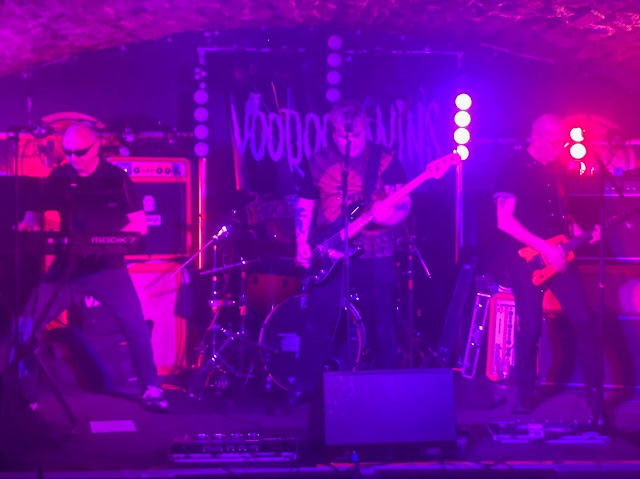It’s not often that a relatively new US project takes the financial hit of a self-organised European tour, but Detroit-based grunge-goth duo VAZUM are not your typical darkscene act. Not only innovating musically with their unique take on the gothic aesthetic they have named “deathgaze”, the band had also thoughtfully released a ‘greatest hits’ album V- which collated their best songs in a re-recorded stripped-down style which more faithfully represents their live sound. Their UK shows had been due to commence the night before in Glasgow, but major electrical supply issues had resulted in a late cancellation, meaning that the Edinburgh gig at the legendary Bannerman’s bar last night was their European debut, and the pair had put together an interesting bill which included two other bands who (whilst also genre-defying) would be of interest to fans of guitar-based goth.
Midlothian quartet Voodoo Twins were fresh from a recent well-received support slot to much-loved tribute band Lizzie and the Banshees, and their high-tempo new wave sound got proceedings off to an energetic start. With twin frontmen Jim Threat and Daz Voodoo alternating vocals, they ripped through songs from last year’s EP and its soon-to-be-recorded follow-up in a well-paced set. The band describe themselves as post-punk electronica, but their live sound seemed more anchored in the sweaty yet cultured sound of 1978 (Jam, Stranglers etc), meaning that they are more likely to receive an invitation to play Rebellion punk festival than Wave Gotik Treffen.
One band who can effortlessly bestride those two events are the ubiquitous Twisted Nerve, with the eighties stalwarts back on home ground and confounding any attempt to pigeonhole their sound. Original bassplayer Norbert Bassbin can still rock the leather strides and studded belt after 45 years of pounding out the punky bassline to traditional encore 5 Minutes of Fame, whilst charismatic frontman Craig Paterson’s initial gothic phase in the band in early/mid 80’s is represented by the classics Medusa, Twisted Nervosis and Séance, the title track from their seminal 1984 EP which still changes hands for well over £50 despite a recent (and sold out) blue vinyl re-release, such is its mythical status amongst worldwide aficionados of the genre.
The band also blend in more recent compositions such as Magik of Trance and Lost Souls, both of which have an early The Cult goth’n’roll feel and give imaginatively-nicknamed guitarist “Dunsy” Dunsmore the chance to demonstrate his six-string skills. Drummer Dave Grave’s starring role in Air-Krasha provides another example of why Twisted Nerve remain a popular, enjoyable and dynamic staple of the live gothic scene, with further gigs within the next six weeks supporting The Doctors of Madness, 1919 and Ghost Dance lined up, as well as a slot at the Dia de Los Muertos festival in LA at Halloween.
Headliners VAZUM provide an altogether different live experience, reaching deeper into the dark soul in a performance of songs drenched in dramatic tension. Zach Pliska’s love of Smashing Pumpkins is obvious from the first bludgeoning chords effortlessly coaxed from his guitar as the duo launch into a coruscating version of Angel, with Emily Sturm’s strong yet vulnerable vocal the perfect counterpoint to Zach’s more spoken delivery.
 |
| Emily |
For all their horror punk visuals and bludgeoning sound, VAZUM are charm personified between songs, with Emily’s (dreadful Detroit goth pun ahoy) sassy chat in particular entertaining the several dozen punters who have braved the day’s persistent rain for a midweek gig. After sarcastically commenting on a two very inebriated young attendees whose attempts at dancing invariably ended in collapse (“those girls need another drink”), she invited the audience to come out with a name for the band’s drum machine, eventually settling on the stereotypically Scottish “Jimmy”. After second song and recent single Blush’s melodic harmonies, Sturm warned the crowd that it would be noise all the way thereafter, a prophecy which bass-heavy versions of current single Breach and predecessors Thief and Nightshade soon proved to be true. With further songs from the forthcoming album Western Violence (including the title track) also showcased, VAZUM again demonstrated their talent for powerful, angular, grungy gothic rock, played with an intensity and volume that fellow Detroit legends MC5 and The Stooges would surely approve of. After a well-deserved and somewhat more subtle encore, VAZUM’s warmly-received European debut came to an all-too-brief end, with further (and somewhat distant) tour stops in Exeter, Vannes and Lyon planned. Catch them if you can!






